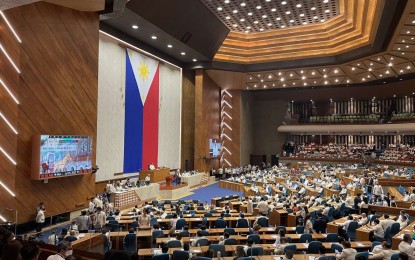
File photo
MANILA – The House of Representatives will continue to help the Marcos administration build a stronger Philippine partnership with the United States, Speaker Ferdinand Martin G. Romualdez said early Thursday in his speech at the Harvard University’s John F. Kennedy School of Government in Boston, Massachusetts.
“The PH-US relations are strong. The military alliance is iron-clad. Our economic relations are robust. And the friendship between our two peoples is solid,” Romualdez said in his policy speech before the Harvard community upon the invitation of the university’s Belfer Center for Science and International Affairs, which was followed by a question-and-answer session with the Harvard community, moderated by Eric Rosenbach, Co-Director of the Belfer Center for Science and International Affairs.
The Speaker said the legislature “will continue to represent the will of the Filipino people under the leadership of President (Ferdinand) Marcos Jr., as the chief architect of Philippine foreign policy, of being ‘a friend to all, an enemy to none.’”
“And it is along these lines that we will continue to craft national legislation to serve our peoples and promote the national interests of our country,” he added.
He, however, said the PH-US relations continue to be an unfinished project.
“Our task is to build upon the strong foundations of the past in order to achieve a common future of shared objectives and mutual prosperity. I hope that all of you here today realize that we can all be important partners in this regard,” Romualdez told his Harvard audience.
“The Philippine Congress, through its mandate, lays out the legal framework wherein the Philippines and the United States can prove time and again that the partnership continues to evolve and be more responsive to promote the interests of their respective peoples.”
He said the conduct of foreign relations has evolved from being an exclusive prerogative of the executive branch to a shared responsibility of the President and Congress.
“Traditionally, foreign relations are conducted by the executive branch of the government and the role of the legislative in foreign policy decision-making is focused on the budgetary and war powers and appointment of diplomatic officials to represent the country overseas,” he added.
The Speaker, however, pointed out that “legislative diplomacy has been increasingly part of foreign policy and international relations with the increased meetings with foreign officials, establishment of inter-parliamentary linkages with other countries and through the laws enacted by Congress.”
“The legislative branches of governments of both countries are mandated to establish a legal framework that will promote transparency and accountability in the government to achieve peace and prosperity for the country,” he said.
He noted that about two years ago, the Philippines and the US celebrated the 75th anniversary of their formal diplomatic relations.
Romualdez said the 1951 Mutual Defense Treaty between the two countries “remains to be relevant and continues to develop individual and collective capacities to address conventional and emerging security threats.”
“Supplemented by the Visiting Forces Agreement and the Enhanced Defense Cooperation Agreement (EDCA), the Philippines and the US conducts combined training and exercises, which increases interoperability between our forces,” Romualdez said, adding that the US is the Philippines’ “only treaty ally.”
He said the US is also one of the country’s biggest trading partners, with a total trade of more than USD21 billion in 2022 and their economic partnership remaining strong despite the challenges brought about by the pandemic.
The US is likewise an important source of Official Development Assistance (ODA) spent mostly on health, peace, and humanitarian projects and programs. In 2021, the ODA from the US amounted to USD629.69 million.
The US is also one of the top sources of net foreign direct investments, with investments valued at USD5.2 billion in 2020, he said.
“The relationship between our two countries is truly multi-faceted and what sets it apart from the partnership with other countries is our shared values and history, mutual respect, and shared goals to build communities that are prosperous, sustainable, and resilient,” he said.
Democracy, the lawmaker from Leyte said, is very much alive in the Philippines as it is in the US with all the three fully functioning co-equal branches of the government – the executive, the legislative, and the judiciary.
He also cited the measures Congress has approved to strengthen RP-US economic partnership and make the Philippines a viable investment destination, such as the Corporate Recovery Tax Incentives for Enterprises Act, which provides for competitive corporate income tax rate; and amendments to the Foreign Investment Act, Retail Trade Liberalization Act, and Public Service Act.
Romualdez said the newly amended Public Service Act now allows 100 percent foreign ownership of key public services, including telecommunications, railways, expressways, airports, and shipping businesses.
“With all the legal frameworks liberalizing economic policies and creating an incentive-driven business environment, now more than ever, US companies will find it easier to invest in the Philippines,” he said. (PNA)
